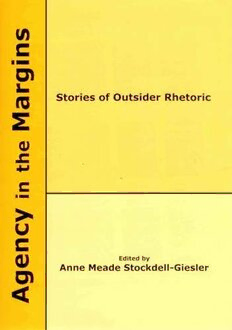Table Of ContentAgency in the Margins
.................17316$ $$FM 10-29-0908:52:47 PS
PAGE1
.................17316$ $$FM 10-29-0908:52:47 PS
PAGE2
Agency in the Margins
Stories of Outsider Rhetoric
Edited by
Anne Meade Stockdell-Giesler
Madison•Teaneck
FairleighDickinsonUniversity Press
.................17316$ $$FM 10-29-0908:52:47 PS
PAGE3
(cid:2)2010byRosemontPublishing&PrintingCorp.
Allrightsreserved.Authorizationtophotocopyitemsforinternalorpersonaluse,or
theinternalorpersonaluseofspecificclients,isgrantedbythecopyrightowner,pro-
videdthatabasefeeof$10.00,pluseightcentsperpage,percopyispaiddirectlyto
the Copyright Clearance Center, 222 Rosewood Drive, Danvers, Massachusetts
01923.[978-0-8366-4214-6/10$10.00(cid:3)8¢pp,pc.]
AssociatedUniversityPresses
2010EastparkBoulevard
Cranbury,NJ08512
ThepaperusedinthispublicationmeetstherequirementsoftheAmericanNational
StandardforpermanenceofPaperforPrintedLibraryMaterials
Z39.48-1984
LibraryofCongressCataloging-in-PublicationData
Agencyinthemargins:storiesofoutsiderrhetoric/editedbyAnneMeadeStockdell-
Giesler.
p. cm.
Includesbibliographicalreferencesandindex.
ISBN978-0-8386-4214-6(alk.paper)
1.Rhetoric—Politicalaspects—UnitedStates. 2.Rhetoric—Socialaspects—
UnitedStates. 3.Rhetoric—UnitedStates—History. 4.Marginality,Social—
UnitedStates. I.Stockdell-Giesler,AnneMeade,1967–
P301.5.P67A44 2010
818.5(cid:2)108694—dc22
2009008223
printedintheunitedstatesofamerica
.................17316$ $$FM 10-29-0908:52:47 PS
PAGE4
Contents
Introduction 9
Anne MeadeStockdell-Giesler
FreedomofSpeechandthePoliticsof Silence:TheCaseof
Ward Churchill 23
MichaelDonnelly
RecoveringtheVoicesoftheFloridaTurpentineSlaves:A
LostRhetoricofResistance 39
Linda BannisterandJamesE.Hurd,Jr.
AHoleStory: TheSpaceofHistoricalMemoryinthe
AbolitionistImagination 68
ZoeTrodd
‘‘Mirrorsofhard,distortingglass’’:Invisible ManasOutsider
Rhetoric 91
IanEdwards
HistoricalMoments,HistoricalWords:TheContinuing
Legacyof MalcolmX’sBlackNationalistRhetoricandHuey
P.NewtoninCommon’sRapMusic 119
CorettaPittman
OutsiderRhetoricinItalian AmericanImmigrant
Autobiographies 143
IlariaSerra
‘‘ToLiveOutsidetheLaw,YouMustBeHonest’’:Words,
Walls,andtheRhetoricalPracticesof TheAngolite 165
ScottWhiddon
‘‘Protectyourselfatalltimes’’: MillionDollar Baby,Boxing,
andFeminineAgency 197
IanEdwards
5
.................17316$ CNTS 10-29-0908:52:51 PS
PAGE5
6 CONTENTS
(Still)CallingOutfromtheCloset?:TheRhetoricof
VisibilityinQueerTVandFilm 225
RebeccaIngalls
Modernity BaptizedintheSpirit:EarlyPentecostalRhetoric
inAmerica 241
JosephW.Williams
Techno-MobMovements:PublicPerformancesandthe
CollectiveVoicesofOutsiders 261
JessicaKetchamWeber
StrategicEssentialismandtheRepresentationof theNatural:
TheCaseof Ecofeminist/ScientistWangariMaathai 287
RaymondOenbring
Conclusion 307
AnneMeade Stockdell-GieslerandRebeccaIngalls
NotesonContributors 313
Index 316
.................17316$ CNTS 10-29-0908:52:51 PS
PAGE6
Agency in the Margins
7
.................17316$ HFTL 10-29-0908:52:54 PS
PAGE7
.................17316$ HFTL 10-29-0908:52:54 PS
PAGE8
Introduction
Anne Meade Stockdell-Giesler
T
HE WESTERN RHETORICAL TRADITION, AS WE KNOW IT, EXTENDS
back at least 2,500 years to its roots in the philosophies of Socrates,
Plato, and Aristotle. That tradition has long honored individual ora-
tions delivered by men in privileged male-dominated forums such as
the political office, the pulpit, and the marketplace. In recent years
scholars have begun to look at individual oratorical performances by
marginalized figures. Heated debates over who ‘‘owns’’ rhetoric and
what consists of legitimate rhetorical performance have taken place.
Scholarshaveputforththeoriesofrhetoricencompassingdiversesitu-
ationsand exigencies.
Whatwehavenotoffered,Iwouldcontend,isaninterpretationand
theorizationoftherhetoricofoutsidergroupsasatypeorclassofrheto-
ric. This collectionof essays studies the rhetoric ofOtherness and ex-
plores how outsiders to mainstream sites for rhetorical participation
find ways to make themselves heard while retaining marginal identi-
ties. The question that this collection attempts to answer is: how do
people who are defined as outsiders create agency—how do they be-
come agents of change, of social, political, spiritual, and cultural
power—outsideofthosespacesthatwetraditionallyunderstandasbe-
longingtothepowerful?
The subjects in this collection vary: authors discuss contemporary
hip-hopmusic;earlytwentieth-centuryliterature;prisonpublications;
post-Civil War treatment of ‘‘free’’ African Americans; queer culture;
and more. The common thread in each essay is the study of how the
groupshavemanagedtosuccessfullyuserhetorictoexertsocialpower
and establish agency in a world that denies them privileged status.
Eachofthesegroups’workhelpstoestablishaconstitutiverhetoricof
otherness, a contribution to a genre of ‘‘Outsider Rhetoric’’ in which
the rhetor(s) create a narrative in which they as subjects have legiti-
macy as rhetors, and in which the audience then is reconstituted to
perceive this legitimacy. As Maurice Charland points out, ‘‘much of
what we as rhetorical critics consider to be a product or consequence
of discourse, including social identity, religious faith, sexuality, and
9
.................17316$ INTR 10-29-0908:52:57 PS
PAGE9
10 ANNE MEADE STOCKDELL-GIESLER
ideology is beyond the realm of rational or even free choice, beyond
the realm of persuasion’’;1 our rhetorical constructions in terms of
who we are as rhetors and as audience members is prerhetorical, and
mustbereconstitutedbyoutsiderstoourownknowngroupidentities
should an outsider want to reach us. What the essays in this book at-
tempttoilluminateareexamplesofoutsiderscreatingagencythrough
constitutiverhetoricswhichattempttocreateanarrativeinwhichthe
outsider has a legitimate right to speak; ‘‘narratives offer a world in
which human agency is possible and acts can be meaningful.’’2 Addi-
tionally, Charland argues, ‘‘one must already be an interpellated sub-
ject and exist as a discursive position in order to be a part of the
audience of a rhetorical situation in which persuasion could occur.’’3
Constitutive rhetoric serves to create communities of audiences—to
define new boundaries and group-identities for rhetorical situations.
This action is, of course, always tied up in concepts of power—and
outsiders,bydefinition,arenotempowered.
How the agents in each of the examples presented by these essays
garners power varies; as Foucault explains in regard to discourse and
powerrelations:
We must conceive discourse as a series of discontinuous segments whose
tactical function is neither uniform nor stable . . . we must not imagine a
world of discourse divided between accepted discourse and excluded dis-
course, or between dominant discourse and the dominated one; but as a
multiplicityofdiscursiveelementsthatcancomeintoplayinvariousstrat-
egies.Discoursesarenotonceandforallsubservienttopowerorraisedup
againstit,anymorethansilencesare....Discoursetransmitsandproduces
power;itreinforcesit,butalsounderminesandexposesit,rendersitfragile
andmakesitpossibletothwartit.4
InthespiritofFoucault’s ideasaboutdiscourse,this bookattemptsto
highlightthediscourseofmarginalizedgroupswhohavebeenconsid-
eredsilenced,disenfranchised,orrhetoricallyunempowered,andhow
they found place and access to create and disperse that discourse
through constitutive rhetorics. The essays will perhaps undo the
black-and-whitenotionsof‘‘mainstream’’and‘‘marginalized’’rhetor-
icalethos and willinsteadfocuson theveryartof outsiderrhetoricin
its complexity; after all, ‘‘a rhetoric to Athenians in praise of Athens
would be relatively insignificant compared to a rhetoric that consti-
tutesAtheniansas such.’’5
Theories of social-movement rhetoric may at first seem relevant
here, and the spirit and intentions of individual rhetors discussed in
this book may often be linked to those of social movement rhetorics.
.................17316$ INTR 10-29-0908:52:57 PS
PAGE10

